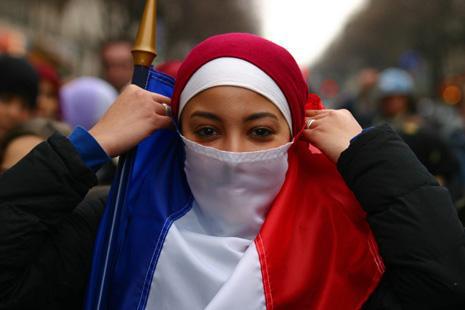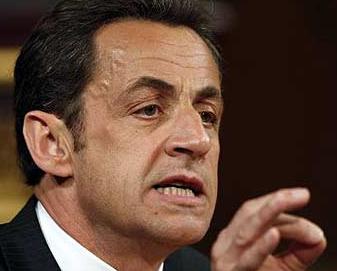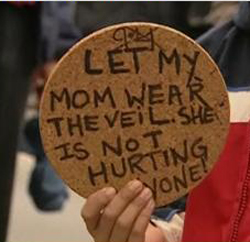The fining of a French Muslim woman for driving whilst wearing a niqab, or face veil, has somersaulted, in the space of a weekend, from political embarrassment to political windfall for President Nicolas Sarkozy.
Controversy raged yesterday after the Government alleged that the husband of the fined woman was a suspected polygamist and social security fraud with possible links to an extreme Islamist organisation. The interior minister, Brice Hortefeux, who made the allegations in a letter released to the press, was accused by moderate Muslim groups and left-wing politicians of cynical “exploitation” of the affair for political gain.
The media spotlight instantly switched over the weekend to Anne’s husband, Lies Hebbadj, 35, an Algerian-born butcher and taxi operator, said to be living in three bungalows near Nantes with his 12 children and four or maybe three, fully-veiled women.
In a letter to the immigration minister, which was released to the press, Mr Hortefeux said that “according to information at my disposal”, Mr Hebbadj belonged to a radical Islamist group called Tabligh. The minister said that Mr Hebbadj was “thought to be living in a polygamous situation with four women”. Each woman was “believed to be” claiming benefit as a single mother.
Mr Hortefeux said that he had asked for an investigation into “possible polygamy and social security fraud”. He urged the immigration minister to consider action to revoke Mr Hebbadj’s French nationality (acquired when he married Anne in 1999).
By associating the veil with extremist movements, polygamy and fraud, the government evidently hopes to seize control of a “burqa” debate which had threatened to spin out of its control. It was announced last week, after months of indecision, that the Government would use emergency procedures to push through a complete ban on the burqa (full-length veil) or niqab (detachable face veil) in public places by July.
According to an opinion poll yesterday, only 33 per cent of French people support a ban. Another 31 per cent approve of banning burqas and niqabs from public buildings like hospitals and schools. The decision to push ahead with a full ban – against official advice – has been widely interpreted in the press as an attempt by Mr Sarkozy to prop up his failing presidency by pleasing his core, hard-right supporters.
Hence the scarcely concealed Government glee at the alleged activities of Mr Hebbadj, the husband of the veiled driver of Nantes. In a statement yesterday, the combined mosques of Nantes said that all Muslims were being “stigmatised” by the “exploitation” of an “insignificant event, which is not representative of the Muslim majority”.
The mayor of Nantes, Jean-Marc Ayrault, who is the leader of the Socialist main opposition group in the National Assembly, accused the Government of “dramatising and exploiting” the affair. “This man’s situation has been known for some time to the services of the State … Why was nothing done about him? Why are they pretending to discover the facts now?” Mr Ayrault asked.

 Two-thirds of French people want a law limiting the use of face-covering Islamic veils such as the niqab and the burqa, with only a minority backing the government’s plan for a complete ban, a poll showed Saturday.
Two-thirds of French people want a law limiting the use of face-covering Islamic veils such as the niqab and the burqa, with only a minority backing the government’s plan for a complete ban, a poll showed Saturday. French President Nicolas Sarkozy has ordered legislation that would ban women from wearing Islamic veils that fully cover the face and body in public places, the government said Wednesday.
French President Nicolas Sarkozy has ordered legislation that would ban women from wearing Islamic veils that fully cover the face and body in public places, the government said Wednesday. About 120 people turned up Saturday afternoon outside Montreal City Hall to express their opposition to Bill 94, saying the legislation reflects cultural xenophobia and has no place in Quebec society.
About 120 people turned up Saturday afternoon outside Montreal City Hall to express their opposition to Bill 94, saying the legislation reflects cultural xenophobia and has no place in Quebec society.